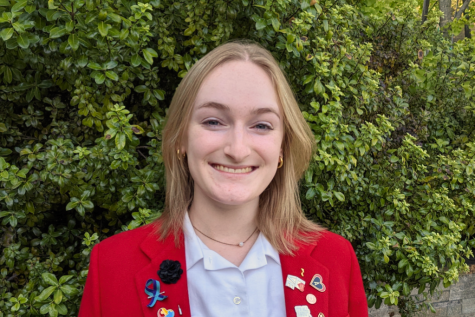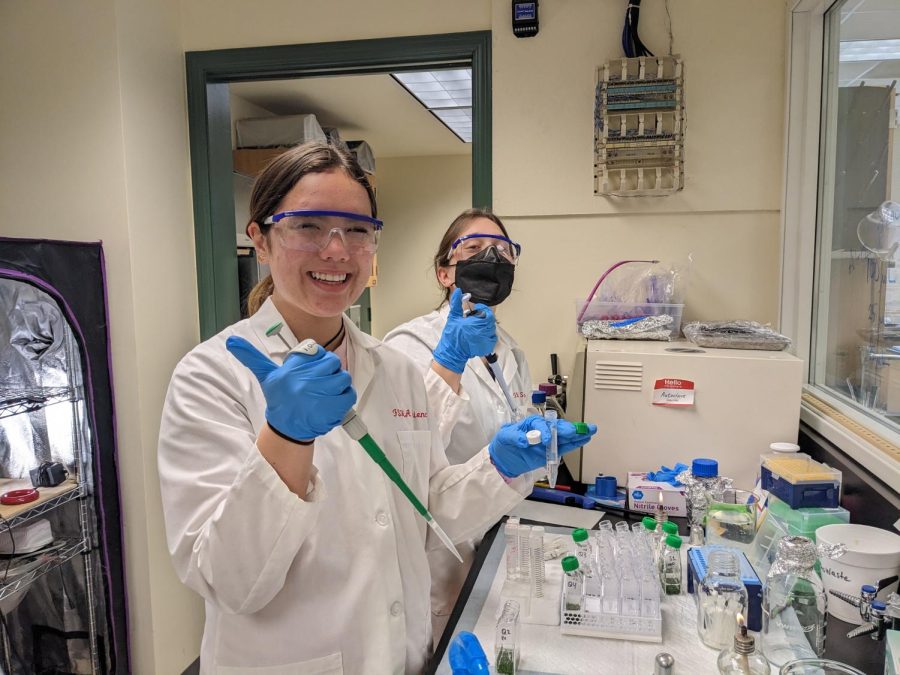A look into the SciSearch experience
Isabella Zirn ‘23 and Michelle ‘23 work in the lab together.
It’s been eight years since Dr. Liz Krider (aka my mom) joined the FSH Staffulty and began teaching the Honors Scientific Research (SciSearch) class. Her vision of a class that replicated the graduate school laboratory experience for high school seniors had come to life. Ever since that day, Dr. Krider has taken on eight to nine new SciSearchers each year of her time at FSH. However, Dr. Krider’s time at FSH has come to an end; this year of SciSearch will be the last with her at the helm.
Year after year, I’ve gotten the chance to hear about the highs and lows of her students’ projects over dinner. I’ve celebrated with her when her algae grew, and I’ve mourned when the bacteria needed for someone’s project died. SciSearch has been a unique experience for both my mom and her students.
“SciSearch is the first academic environment I ever had that taught me not only that I could fail, but that failure could lead to greater success. I saw that entire cycle in such a condensed amount of time,” Laura DiPietro ‘16 said.
SciSearch’s goal is to give FSH students the opportunity to see what graduate school would feel like in a STEM area. For the first semester of their senior year, students formulate, draft and finalize a proposal that outlines an original research project within environmental science and microbiology. Some projects have looked at how algae can be used to fuel cars, while other SciSearchers have explored the possibility of preventing infections without the use of antibiotics.
“The SciSearch experience inspired me to continue to pursue research for what I am passionate about. I see it as the beginning of my research experience when I learned to navigate through scientific journal reading and be comfortable with the fact that I can’t read everything and know everything,” Cynthia Ma ‘19 said.
Isabella Zirn ‘23, a student currently in SciSearch, is finishing up her project with Michelle Houser ‘23 on using microalgae to remove nitrogen, ammonium and phosphorus from wastewater. They also explored the possibility of recycling the algae used in their experiments to create biofuels, an alternative fuel source for vehicles.
“SciSearch provided the basis to becoming a scientist in the future because we not only learn about lab safety, how to conduct experiments, how to collaborate with other people, but also the skills you need for writing scientifically. I really liked how Dr. Krider has given us that foundation. If we do decide to go into the scientific or medical world, or even if we don’t conduct another experiment in college or don’t plan to have a future career in science, we do know how to dissect these papers and how to emulate that kind of writing as well,” Zirn said.
After writing their proposals, students then carry out their proposed experiments in the second semester of their senior year. This stage of the class is often paired with a significant amount of uncertainty.
“My favorite moment in that entire year was coming into the classroom after having a breakdown in my kitchen at 3 a.m. when I figured out my research project wasn’t going to work. After countless hours of research, everything unraveled because of one small detail. We had a project deadline that day, and I was so nervous to come to class. I had never ‘failed’ that way in anything academic before. The shock and relief that simultaneously ran through me as Dr. Krider exclaimed to me with a smile ‘THIS is science!’ will never leave my mind,” DiPietro said.
DiPietro’s project focused on using a plant hormone in combination with other cancer drugs to explore if they have a combined effect on breast cancer tumors. DiPietro’s original project idea led to placement at City of Hope, a cancer treatment and research center, to work with cancer researchers with her project partner Alyssa Carter ‘16. To their surprise, the effect of the combinations was opposite to their predictions.
“Aided by the peaceful and encouraging words of Dr. Krider, I was able to internalize so many positive lessons and life habits from what would have otherwise been a very discouraging experience. Now I know how to seek out new opportunities with less inhibition, to work harder than I thought I could, and to be okay with failing hard and to watch flowers bloom from the wreckage,” DiPietro said.
SciSearch fosters an environment where students are encouraged to go down “rabbit holes” of curiosity.
“I think the most unique and empowering experience about SciSearch was that not only were the young women in that class given a lot of responsibility, but they were also given the authority necessary to fulfill those responsibilities… We quite literally were able to pursue opportunities that weren’t open to most of us before that class,” DiPietro said.
Because the work demanded of SciSearchers can be intimidating, it is easy for one to experience something called “imposter syndrome.” Many students experience feelings of inadequacy when placed in situations where much is expected of them, even if said students are able to perform at the level of these expectations.
“Dr. Krider really created a safe learning space for us. Our first lecture ever was on imposter syndrome and that sets the tone for the rest of the year. We were constantly reminded to be confident in our own effort while appreciating other people’s work,” Ma said.
In addition to growing her students’ academic confidence, Dr. Krider also emphasized the importance of the journey over the destination in a scientific research setting.
“Even though there are many times when the outcome is not what we expected, there is always something to be learned and the class really helped me to see that it is the process that means the most,” Ma said.
Dr. Krider also places importance on the experience of carrying out research.
“I see SciSearch more as a family and Dr. Krider has been such a wonderful ‘mother’ to all of us… She makes sure that when we get into the lab, it’s a space for lab only and it’s a space for us to express a side of ourselves that we don’t typically see in our high school years,” Zirn said.
Of course, I have always seen Dr. Krider as my mother (probably because she actually is) but throughout this whole school year, I was able to witness firsthand how my mom worked tirelessly to instill confidence in my peers and I concerning our potential and academic capabilities. While I was already aware that my mom is a complete rockstar before stepping into class for my first day of SciSearch, I can attest that the research environment that she and FSH have created has changed the lives of countless Tologs. While Dr. Krider will be missed from the Hill, her teaching ethic of journey before destination and individually encouraging each of her students to embrace the challenge of scientific research will live on.

Julia Krider is a senior at Flintridge Sacred Heart, and is the Shield’s managing editor this year. She has been part of the paper since sophomore year,...

